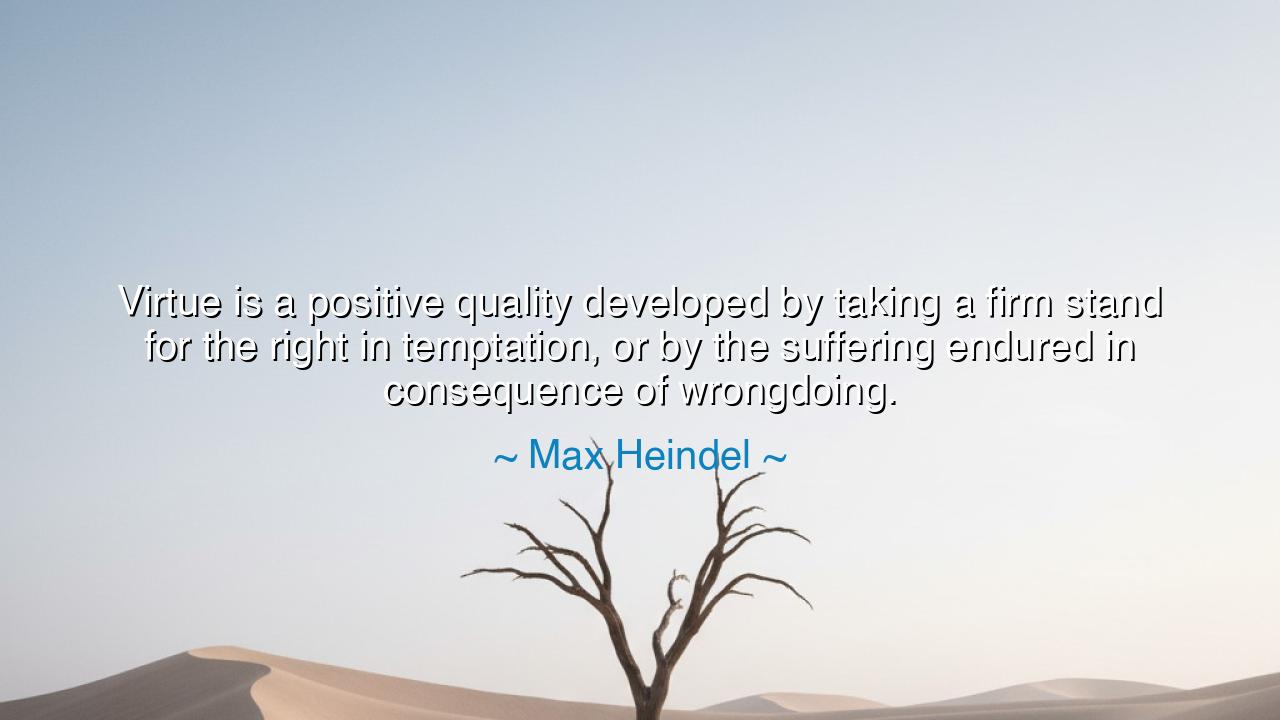
Virtue is a positive quality developed by taking a firm stand
Virtue is a positive quality developed by taking a firm stand for the right in temptation, or by the suffering endured in consequence of wrongdoing.






In the words of Max Heindel, “Virtue is a positive quality developed by taking a firm stand for the right in temptation, or by the suffering endured in consequence of wrongdoing.” These words are not light as feathers, but heavy as stone, forged in the furnace of human struggle. They remind us that virtue does not spring from comfort, nor from ease, nor from idle dreaming. It is born in the clash between desire and duty, between weakness and strength, between the shadows of error and the light of truth.
When a man or woman stands before temptation, they face a battlefield greater than any field of war. The armies of desire call loudly, promising sweetness, pl
With the author
Same category
Tocpics Related
Barbara Walters Quotes
Larisa Oleynik Quotes
Beauty Quotes
Meg Whitman Quotes
Ira Hayes Quotes
Victor Hugo Quotes
Cool Quotes
Mark Twain Quotes
Notable authors






TDThu Dong
This quote also makes me think about the role of suffering in moral development. Is experiencing the consequences of wrongdoing necessary to truly understand virtue, or can reflection, empathy, and learning from others also build ethical character? How does one balance the constructive aspects of suffering with the potential psychological harm it can cause? Exploring these ideas could provide a more comprehensive view of how virtue is developed through both experience and conscious ethical cultivation.
NLNgoc Le
I find this viewpoint thought-provoking but wonder about its applicability in everyday life. How do people identify the ‘right’ stand when moral dilemmas are complex and not clear-cut? Does virtue require certainty about the ethical choice, or is it enough to act with good intent even if outcomes are imperfect? Considering these questions could deepen our understanding of moral philosophy and the challenges of cultivating character in a nuanced, real-world context.
NVle ngoc vy
Reading this makes me reflect on the societal implications of virtue. Should communities or institutions support individuals in developing virtue through guided experiences of temptation and accountability? How does social context influence one’s ability to take a firm stand for the right, and are some people disadvantaged in cultivating virtue due to systemic pressures or lack of support? Examining this could broaden the discussion beyond individual morality to include ethical development within society.
ANTu Anh Nguyen
This statement raises questions about the nature of moral growth. Does enduring the consequences of wrongdoing inherently strengthen virtue, or can it also lead to bitterness or discouragement? How can individuals transform mistakes into positive development without becoming overly self-critical? Understanding these nuances might provide insight into the complex interplay between ethical choices, personal responsibility, and emotional resilience in shaping virtuous character.
HNHien Nguyen
Max Heindel’s perspective on virtue prompts me to wonder about the balance between intention and consequence. Is virtue measured more by resisting temptation or by how one responds to the consequences of wrongdoing? Can someone who errs but learns and grows exhibit more virtue than someone who avoids wrongdoing entirely? Exploring this could shed light on how moral development is shaped by both action and reflection, and whether suffering is essential for cultivating ethical character.